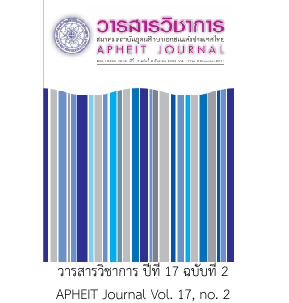THE DEVELOPMENT OF A PROGRAM FOR ENHANCING COOPERATIVE LEARNING AT ASSUMPTION UNIVERSITY: AN EXPERRIMENTAL STUDY
Main Article Content
Abstract
Scant research attention has been given to enhancing cooperative learning behaviours using the experimental method in Thai culture. This experimental study aimed at developing a program for enhancing cooperative learning of students and testing the effectiveness of the program. Furthermore, it examined the influence of the cooperative learning program on students’ level of (a) cognitive learning skills, (b) academic achievement, (c) emotional intelligence, and (d) organizational citizenship behaviours.
A true experimental research design with a pretest-posttest control group was implemented. Quantitative methods utilized descriptive as well as the inferential analyses. Independent sample t-test, paired t-test, and ANOVA were utilized as the major tools to test all hypotheses Qualitative methods utilized observations and written diaries with fist-hand experiences of students.
Six out of eight hypotheses were supported by the data. It was found that there was a significant improvement in students’ (a) cognitive learning skills, (b) emotional intelligence, and (c) organizational citizenship behaviours in the experimental group after the treatment program was administered. However, there was no significant improvement in academic achievement after the treatment program was administered, thus one hypothesis had to be rejected.
Significant differences were also found in students’ (a) cognitive learning skills, (b) emotional intelligence, and (c) organizational citizenship behaviours in the experimental group as compared to the control group after the treatment program was administered.
Furthermore, students with different genders did not have different levels of (a) cognitive learning skills, (b) academic achievement, (c) emotional intelligence, and (d) organizational citizenship behaviours. Students with different grade point averages did not have different (a) cognitive learning skills, (b) emotional intelligence, and (c) organizational citizenship behaviours.
However, differences in the academic achievement were found in that, students with higher grade point averages scored higher in academic achievement than students at the lower end of the continuum. Thus one hypothesis was partially supported by the data.

